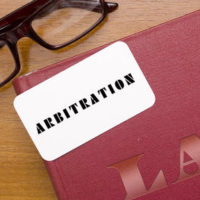The Four Stages of Business Law Arbitration

Is your company currently locked in a commercial dispute? If so, you may need to (or be required to) seek arbitration. Compared to traditional litigation, arbitration offers businesses several key benefits, including that it is generally faster and cheaper than litigation, and that the proceedings can be kept fully confidential. For companies facing upcoming arbitration proceedings, it is imperative that they are fully prepared for the process. To help you get started, our experienced West Palm Beach business arbitration lawyers explain the four basics stages of commercial arbitration.
- The Arbitration Agreement
Arbitration is a voluntary process. For a case to actually get to arbitration, the two parties must both agree to arbitrate their dispute. There are two ways that this happens:
- Pre-dispute arbitration agreements; and
- The referral of an existing dispute to arbitration.
On the latter, the parties may decide that arbitration is simply in everyone’s best interest so that the dispute can be brought to an end. This sometimes happens in partnership and shareholder dispute cases. Though, most often, arbitration occurs because of the first reason: pre-dispute arbitration provisions included within a contract. If your business signed a commercial agreement, there may be a clause that compels you to seek arbitration.
- Selection of an Arbitrator
Before the actual arbitration proceedings begin, the parties are allowed to have some input in selecting a fair, neutral arbitrator for their dispute. To help facilitate this process, the American Arbitration Association provides a roster of available arbitrators. Parties can seek a neutral arbitrator that has considerable experience handling similar disputes. This part of the process is very important, so by the time the arbitrator selection occurs, businesses should already have qualified legal representation.
- Preparing for the Hearing
Arbitration works much like a mini-trial; and just like a trial, proper preparation is a must. Businesses need to put time into preparing for their hearing so that they can present the best possible case on their behalf. This includes doing everything from assembling all of the relevant evidence, such as documents and records, to interviewing and preparing relevant witnesses.
- Presenting Your Case
At the hearing itself, your attorney will be able to make an opening statement and then present the relevant evidence that has been prepared. The arbitrator will be empowered to ask questions in order to assess the information at hand. As in a traditional court setting, the proceedings end with each side presenting a closing argument. Though many core aspects of arbitrations are similar to trials, it should be noted that the hearing process is somewhat less formal. For example, most arbitrators follow evidentiary rules that are less strict than are the ones that are used in courtrooms.
Get Business Arbitration Help
At Pike & Lustig, LLP, our business law attorneys have extensive experience representing companies through arbitration. To learn more about what we can do for your company, please contact our team today to set up your free case evaluation. From our offices in West Palm Beach, Wellington and Miami, we serve companies throughout South Florida, including in Fort Lauderdale, Hialeah and Doral.
Resource:
adr.org/aaa/faces/s/about?_afrLoop=326968226436915&_afrWindowMode=0&_afrWindowId=10gh84c7vh_52#%40%3F_afrWindowId%3D10gh84c7vh_52%26_afrLoop%3D326968226436915%26_afrWindowMode%3D0%26_adf.ctrl-state%3D10gh84c7vh_96
